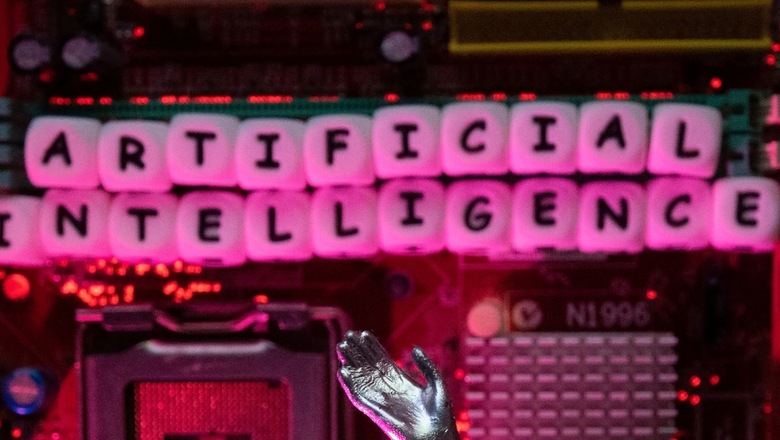
views
“In a world driven by innovation, our responsibility lies in shaping technology to uplift humanity, not to divide or oppress.”
In a dynamic era marked by remarkable technological strides, India stands at a pivotal juncture, compelled to address the intricate ethical and societal dimensions of artificial intelligence (AI) and meta technologies. As the world hurtles forward into a future where technology shapes the course of society, the Indian subcontinent finds itself at a crossroads, facing a crucial decision: How to harness the transformative power of artificial intelligence, while ensuring that its deployment remains ethical, equitable, and aligned with human rights principles.
INTRODUCTION
The Indian artificial intelligence market has witnessed phenomenal growth, with the market size reaching an impressive $680 million in 2022, and projections indicating an exponential rise to $3,935.5 million by 2028, reflecting an annual growth rate of 33.28% during the period 2023-2028. This surge in AI adoption underscores the potential of technology to reshape industries, revolutionize healthcare, and transform governance. However, this trajectory also underscores the urgency to establish a comprehensive regulatory framework that ensures AI’s responsible and ethical use.
THE NEED
Regrettably, despite the burgeoning AI landscape, India currently lacks codified laws, statutory rules, or government-issued guidelines that specifically regulate AI technologies. This regulatory void has given rise to an ecosystem where AI can be deployed without clear ethical oversight, potentially leading to harmful consequences. Recently, the Minister of State for Electronics and Information Technology, indicated that India plans to regulate AI but primarily from the perspective of preventing user harm.
Curiously, India’s Digital India Bill and Digital Personal Data Protection Bill, which one might expect to address AI regulation, remain conspicuously silent on this crucial matter. The absence of a comprehensive legal framework raises important questions about the deployment of the accountability of this technology and potential misuse.
One poignant incident that highlights the urgent need for AI regulation is the rejection of Proposal 7 titled “Assessing Allegations of Biased Operations in Meta’s Largest Market”. The proposal has sought accountability from Meta, formerly known as Facebook, for allegations related to biased content dissemination, inadequate content moderation, and lack of transparency in platform practices. The rejection of the shareholders of this proposal raises concerns about user rights, human rights, and the broader implications of allowing powerful technology companies to operate unchecked.
In a 2021 report, Amnesty International uncovered unsettling human rights violations linked to Meta’s AI algorithms. The report revealed how the algorithms of the company allegedly amplified content that fueled violence during the Rohingya crisis in Myanmar. This incident underscores the ethical imperative of algorithmic transparency and fair content moderation. Such cases emphasize the pressing need for regulatory measures that ensure that technology companies are held accountable for the impact of their algorithms on vulnerable communities.
The aftermath of the Delhi riots in February 2021 has further exposed the potential misuse of AI and data-driven technologies. Such an attitude, if true, raises ethical questions about how technology companies prioritize user safety and well-being based on their location. Equally concerning is Meta’s lack of a specific definition of hate speech for the Indian or any national context. This ambiguity opens the door for algorithmic biases to thrive, leading to potential discrimination and misinformation. Addressing these algorithmic lapses through governmental regulation is imperative to prevent further harm. The VAHAN database, maintained by the union ministry of Road, Transport, and Highways, was reportedly also exploited to target specific groups during the riots. This incident illustrates the potential dangers of unchecked access to data and the necessity of stringent oversight to prevent the discriminatory application of AI algorithms.
THE WAY FORWARD
The path forward requires a multi-pronged approach that combines ethical considerations, interdisciplinary collaboration, and robust regulatory mechanisms.
First, a national strategy that promotes human rights within the development and deployment of emerging technologies is imperative. Countries like Australia and Japan have established ethical frameworks and policies to guide the responsible use of AI. India can draw valuable insights from these examples and build an overarching national strategy that aligns technology innovation with democratic values.
Second, AI development should involve experts from diverse fields, including sociology, philosophy, and cultural studies. This multidisciplinary approach is vital in crafting AI interfaces that prioritise ethical considerations and promote meaningful human interaction. Requiring tech giants to establish diverse public policy teams can also enhance social cohesion and ethical oversight.
Third, addressing algorithmic biases necessitates regular audits and testing of AI systems. Developers should adhere to guidelines that ensure fairness and equity in AI outcomes. This commitment to ethical AI aligns with India’s role as a neutral jurisdiction, poised to set global standards in AI regulation.
In conclusion, India’s journey through the AI landscape is a transformative one, defined by both promise and peril. As AI technologies continue to evolve, they hold immense potential to drive innovation, economic growth, and societal progress. However, this potential must be harnessed responsibly, with a keen focus on safeguarding human rights, upholding democratic values, and preventing the misuse of technology.
By implementing a comprehensive regulatory framework that promotes algorithmic transparency, combats biases, and protects individual privacy, India can strike a delicate balance between technological advancement and ethical responsibility. This opportunity, nestled within the intricate web of technology, accountability, and democratic ethos, calls for India to define itself not merely as a participant but as a pivotal shaper of the boundless potential of AI. As the world watches, India’s choices today will ripple through generations, influencing how AI shapes the future of humanity.
Dr Fauzia Khan is Member of Parliament, Rajya Sabha, and former Minister of State for GAD, Education, Health, and WCD in the Government of Maharashtra. Sanika Deshmukh is a law student and policy consultant. Views expressed in the above piece are personal and solely that of the author. They do not necessarily reflect News18’s views.



















Comments
0 comment